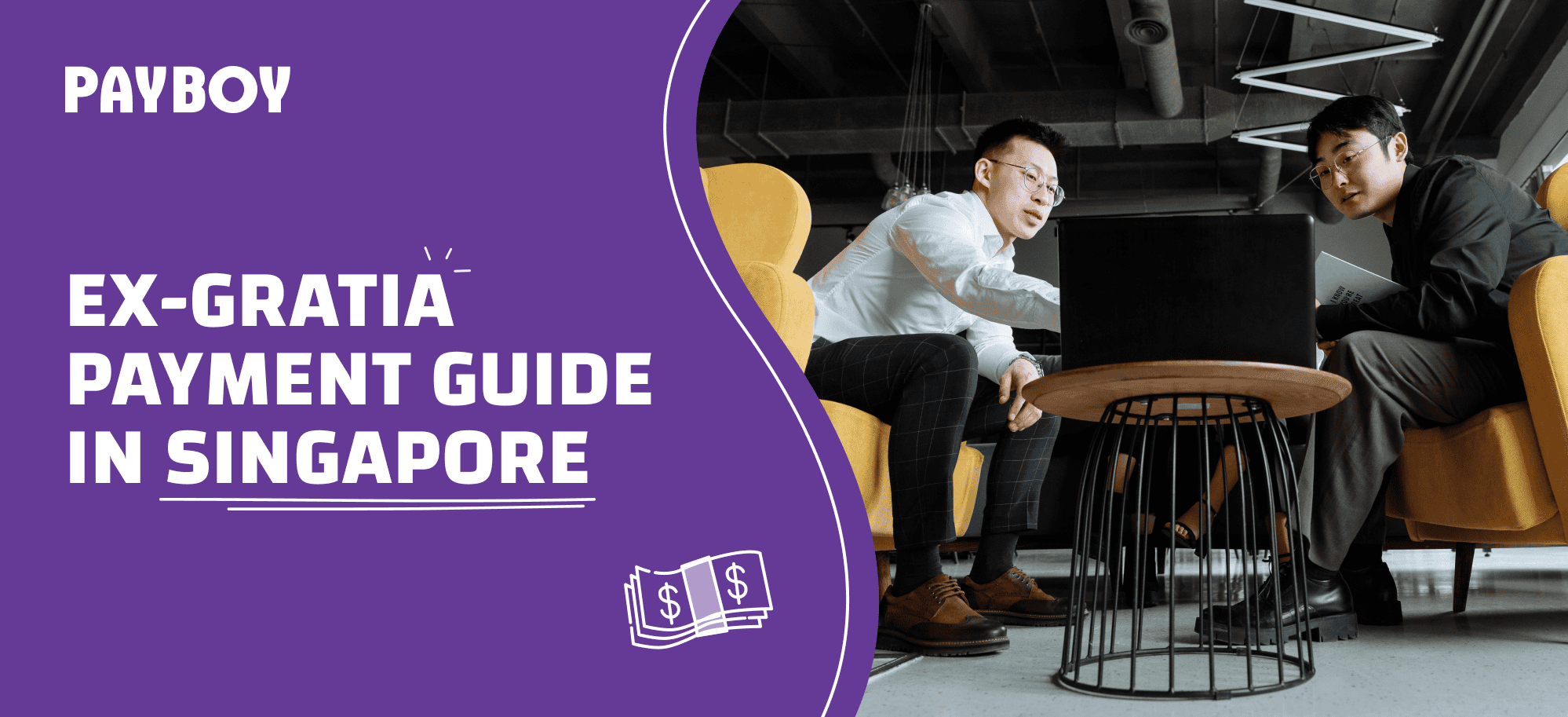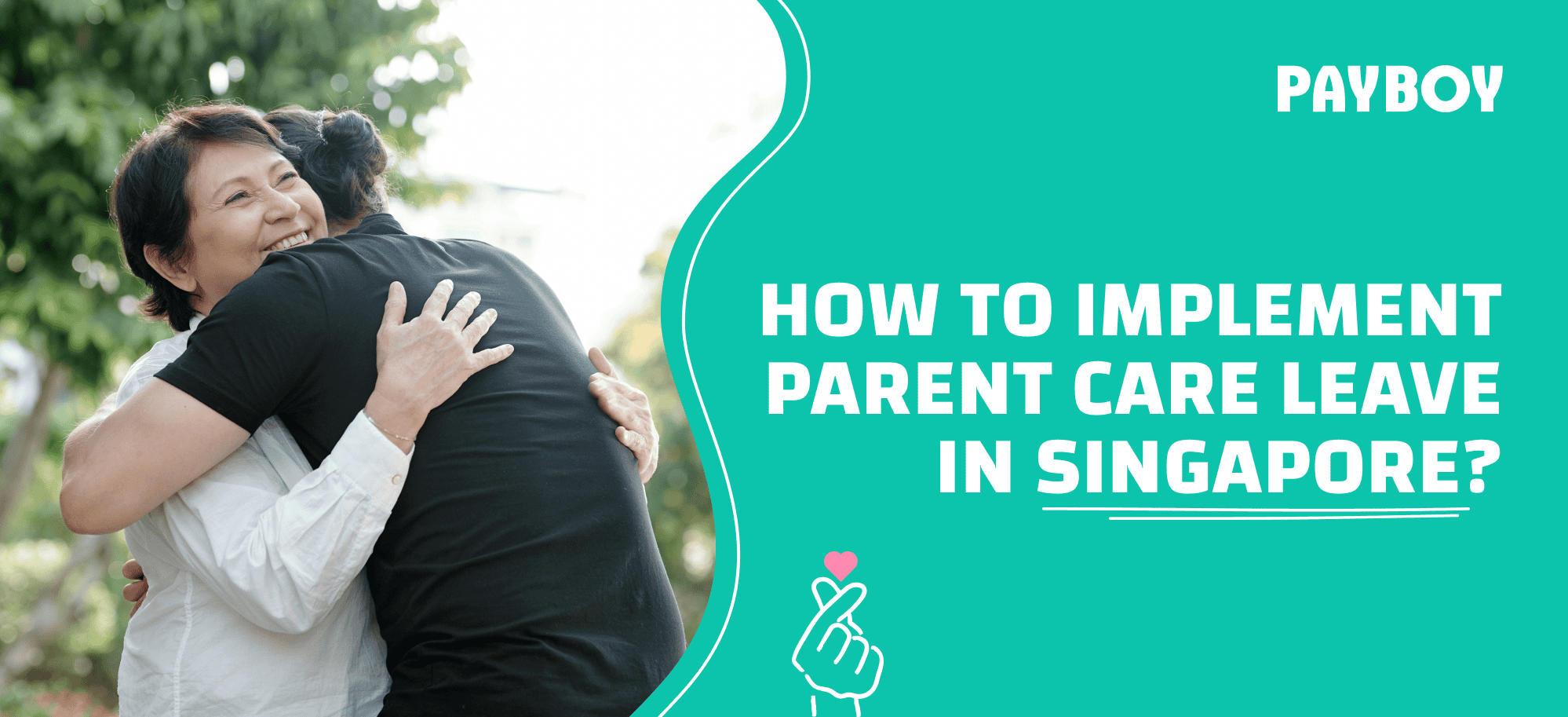Have you ever heard of ex-gratia payments and how they differ from bonuses, severance pay, and gratuities? In this comprehensive guide, we'll discover everything you need to know about ex-gratia payments in Singapore, covering their definition, nuances, and tax and CPF implications, as well as explore the benefits of offering ex-gratia payments for both employers and employees. Let's dive in!
What is an ex-gratia payment?
“Ex-gratia” means “by favour” or “by virtue of grace” in Latin. An ex-gratia payment is one made voluntarily by an organisation (employer, government agency, or insurer) to an individual.
Ex-gratia payments are not legally required, but they are frequently made as a gesture of goodwill to help employees during difficult times or to recognise their contributions to the organisation.
What is the difference between bonuses and ex-gratia payments?
While both bonuses and ex-gratia payments provide financial rewards to employees, they differ significantly.
Purpose
- Bonus: Bonuses are typically rewards for exceeding performance targets or meeting company goals, which are frequently outlined in contracts or policies.
- Ex-gratia payment: Ex-gratia payments, on the other hand, are discretionary and made voluntarily by employers as acts of goodwill or in exceptional circumstances such as redundancy, termination, or other situations in which the employee may face financial hardship.
Eligibility
- Bonus: Eligibility for bonuses may be based on factors such as job grade, performance level, and whether the employee meets specific criteria outlined in the company policy or a legal act.
- Ex-gratia payment: There may not be a set criteria for eligibility for ex-gratia payments. The employer decides who receives them based on the specific situation.
Legal Obligation
- Bonus: In some cases, bonuses might be mandatory by law. They are often subject to specific terms and conditions.
- Ex-gratia payment: Ex-gratia payments are voluntary and are not typically required by law or employment contracts. They are made at the discretion of the employer.
Tax Treatment
- Bonus: Bonuses are typically considered taxable income and must be withheld unless they meet specific tax-exempt criteria.
- Ex-gratia payment: The tax treatment of ex-gratia payments varies depending on the jurisdiction and the circumstances surrounding the payment. They may be taxed in some cases, but not in others, up to a certain threshold.
Frequency
- Bonus: Bonuses are typically awarded periodically, such as annually or quarterly, or upon achievement of specific milestones.
- Ex-gratia payment: Ex-gratia payments are typically made on an ad hoc basis and may occur in response to specific events or circumstances.
Tip: Read our in-depth guide, "Bonus guide for employers in Singapore" to learn more about the various types of bonuses and whether they are subject to CPF.
What is the difference between severance and ex-gratia payments?
Severance payments are specifically tied to the termination of employment, which is often due to factors such as redundancy, layoffs, or early retirement. They are intended to provide financial assistance to employees leaving the company and can be based on factors such as length of service and salary. They are often required by law or contractual agreements to ensure that employees are treated fairly.
In contrast, ex-gratia payments rely solely on the company's goodwill and are rarely mentioned in employment contracts. They are typically used to address specific situations, such as resolving disputes, compensating for inconvenience caused by termination, or incentivising the employee to sign a settlement agreement that waives their right to further legal action.
What is the difference between gratuities and ex-gratia payments?
A gratuity is a lump-sum payment given to employees as a reward for their long-term service to an organisation. It is often considered a legal entitlement for employees who meet certain criteria, such as retirement, resignation, or completion of a specified period of service.
Ex-gratia payments, however, are a one-time gesture of goodwill that is commonly used to compensate for inconvenience, hardship, or the resolution of a dispute without admitting fault. They are not tied to specific retirement or employment terms but are determined by the employer's discretion based on the circumstances.
When do employers offer ex-gratia payments?
Employers may offer ex-gratia payments in various situations to demonstrate appreciation for employees and maintain positive relationships within the workforce. Some common scenarios include:
1. Exceptional Performance: Employers can choose to reward employees for exceptional performance or accomplishments that go above and beyond their regular duties.
2. Financial Hardship: When employees face financial difficulties due to unforeseen circumstances such as illness, family emergencies, or natural disasters, employers may make ex-gratia payments to offer support and assistance.
3. Voluntary Termination: When employees voluntarily resign or retire, employers may provide ex-gratia payments as a token of appreciation for their service and to ensure a smooth transition.
4. Special Occasions: Employers may choose to make ex-gratia payments on special occasions such as holidays, company anniversaries, or milestone achievements to boost morale and show appreciation for their employees' contributions.
5. Settlement Agreements: In some cases of dispute resolution or termination, employers may provide ex-gratia payments as part of a settlement agreement in order to resolve issues amicably and avoid legal action.
How much ex-gratia payment is the employee entitled to?
Unlike statutory payments or those outlined in employment contracts, ex-gratia payments are voluntary and not subject to specific legal requirements or regulations. They ultimately depend on the employer's decision and the specific circumstances surrounding the payment.
Is ex-gratia payment subject to CPF contributions?
CPF contributions are payable on the ex-gratia cash payment that is given as a token of appreciation for the employee's past services or contributions to an organisation.
However, CPF contributions are not payable on the ex-gratia payment that is given as compensation for the employee’s loss of employment.
Tip: Are you overwhelmed by your responsibilities as an employer to pay your employees’ CPF contributions? We’ve put together a comprehensive CPF guide to give you peace of mind!
Is ex-gratia payment tax deductible for companies in Singapore?
Ex-gratia payments are tax-deductible when the business continues its operations, as they support ongoing income-producing activities.
However, ex-gratia retrenchment payments are not tax deductible if the business ceases operations entirely. This is due to the discretionary nature of such payments, which include goodwill elements and are not wholly and exclusively incurred in income production when the business ceases its activities.
Is ex-gratia payment taxable for employees in Singapore?
According to the Income Tax Act, income tax is meant to be levied on gains or profits from any employment, including wages, bonuses and gratuity.
Ex-gratia payments made as compensation for loss of employment, such as during retrenchment or the end of employment term, are generally not taxable. These are considered capital receipts and are not earned income.
However, ex-gratia payments for past services are taxable as they are considered payment for services rendered. Determining taxability should consider the nature and intent of the payment rather than its terminology in contracts.
What are some benefits of offering ex-gratia payments?
Offering ex-gratia payments can provide several benefits for both employers and employees:
1. Employee Morale: Ex-gratia payments can boost employee morale by recognising and rewarding outstanding performance, dedication, or loyalty. This recognition promotes a positive work environment and enhances employee satisfaction and engagement.
2. Retention: Providing ex gratia payments can increase employee loyalty and retention rates. Employees who feel valued and appreciated are more likely to remain with the company and contribute positively to its success.
3. Motivation: Ex-gratia payments serve as incentives for employees to go above and beyond in their roles, thereby driving motivation and productivity. Recognising and rewarding outstanding performance motivates employees to strive for excellence and accomplish their objectives.
4. Positive Employer Brand: Offering ex gratia payments shows that the employer values and cares about its employees' well-being. This can enhance the company's reputation as an employer of choice to attract top talent and improve its employer brand.
5. Retention during Economic Downturns: During times of economic uncertainty or downturn, ex gratia payments can help to retain key talent. Even when financial constraints prevent regular salary increases or bonuses, ex gratia payments demonstrate to employees that their contributions are still recognised and valued.
6. Mitigating Negative Circumstances: Ex-gratia payments can assist employees facing unexpected challenges such as illness, family emergencies, or personal crises. This support can help employees navigate difficult times and maintain their commitment to the organisation.
Offboard your employees smoothly with Payboy HR software!
The transition to handover, document, and offboard an employee can be an adjustment period for both parties involved. If you're seeking an efficient way to streamline and document your employee offboarding processes, look no further. Payboy has got you covered with a comprehensive offboarding module within our system to help you keep the journey organised!
An employee may also leave your company before the last day of the month, depending on when they serve their notice periods, which will result in an incomplete month of work. With our fully compliant, customisable, and integrated payroll processing module, you can automate the calculation of an incomplete month’s salary, add ad hoc pay items such as ex-gratia on the itemised payslips, and also enjoy additional features that are designed to save you time and effort.
Streamline your HR processes with Payboy today!
As a PSG-approved HRMS, Payboy provides a robust system to help you manage your HR tasks so that you can focus on your business and people!
With our wide range of modules, you can customise a solution to meet the specific needs of your business:
Payroll Processing | Leave Management | Claims Management | Applicant Tracking | Time Attendance | Shift Scheduling | Appraisal System | Inventory Management | Project Costing | Training Management | Benefits





















